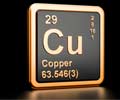- Cancer cells require copper-binding proteins to develop and spread in the body
- This could possibly open the door to new cancer treatments
Most cancer-related deaths are due to metastases, or secondary tumors, which develop in various body parts, such as the liver or lungs. The signaling networks that cancer cells employ to multiply and disseminate across the body include a protein known as Memo1. Previous studies have demonstrated that breast cancer cells’ capacity to metastasize is reduced when the Memo1 gene is inactivated.
Link Between Copper and Cancer Cells
A Chalmers research team was interested in learning more about the relationship between copper and Memo1. In a recent study, the researchers used a series of test tube procedures to investigate the Memo1 protein’s capacity to bind copper ions. The results were published in the scientific journal PNAS. They learned that the protein exclusively binds copper in its reduced state. It is the most prevalent type of copper ion in living cells. It is a significant discovery since, despite being required by the body, reduced copper also contributes to redox events that harm or even kill cells. The scientists discovered that Memo1 prevented copper’s harmful redox reactions when it interacted with the metal.“This poses a risk for the tumor to be dependent on a lot of copper because it can provoke chemical reactions that are harmful to the cancer cells. We believe that Memo1, by binding copper when needed, protects the cancer cells so that they can continue to live and spread,” says Wittung-Stafshede, one of the study’s lead authors.
The researchers also discovered that Memo1 can associate with Atox1, another copper-binding protein that is present in human cells. The research team has previously demonstrated that Atox1, with the aid of copper, contributes to the ability of breast cancer cells to travel and produce metastases. Atox1 is a copper transporter inside human cells. Overall, the results of the current study suggest that targets for cancer treatment in the future may include copper and copper-binding proteins.
Link Between Copper and Breast Cancer Cells
“We saw how copper ions could transfer between the proteins Memo1 and Atox1 in test tubes, and when we looked in breast cancer cells, we found that the two proteins were close to each other in space. Based on this, we conclude that the exchange of copper between these proteins can take place in cancer cells as well as in test tubes and thus be of biological relevance,” says Pernilla Wittung-Stafshede.The next step for the researchers is to identify the copper ion binding sites in Memo1 and how the presence of copper affects Memo1’s functions in the development of cancer.
Source-Medindia
















